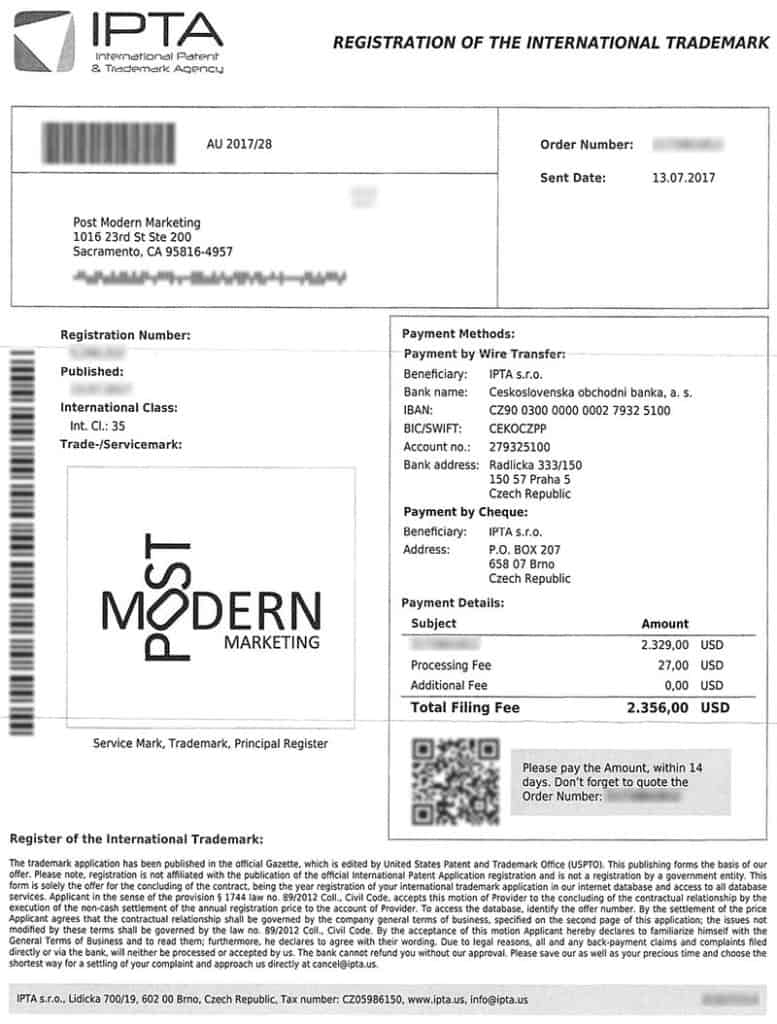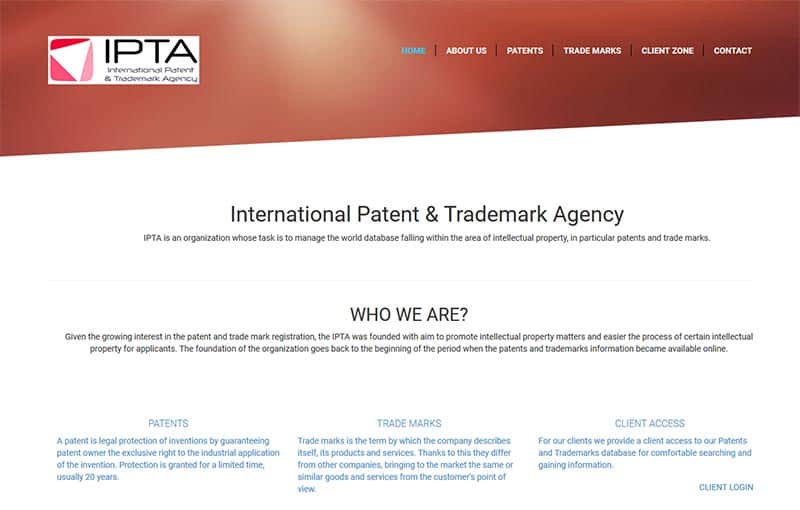New Scam Targets Business Owners Filing For Trademarks
The so-called "International Patent & Trademark Agency" is attempting to bilk business owners out of thousands of dollars.
Get a Free Marketing Analysis and Consultation
Nowspeed can review your Website, SEO, PPC, Email or Social Media Campaigns and identify ways to make an immediate impact!
Recently, Nowspeed went through the formal process of obtaining a trademark for our business name and logo. Applying for a trademark involves a lot of paperwork, patience, and filing fees, all of which can be frustrating. But once you reach a certain level of notability, it’s necessary to do so in order to protect yourself and your customers.
Once you have successfully obtain a trademark, trademark law requires that the trademark be publicly published in the U.S. Patent and Trademark Office’s Trademark Official Gazette. This gives interested parties the opportunity to file an opposition against any granted trademarks which might be infringing or damaging.
However, scammers like the “International Patent & Trademark Agency” are mining these publications for business addresses to target.
A few weeks ago, we received a piece of mail that purported to be from the “International Patent & Trademark Agency.” Not thinking about it too much, we assumed that this was an official communication regarding the status of our trademark having to do with international protections.
But when we opened it up and started to look closer, it soon became apparent that something was seriously off:

First of all, the whole thing struck us a very plain and lacking in detail. The entire mailer was comprised of a single sheet of paper, with information printed on both sides. The back had a “General Terms of Service” breakdown, while the front had a request for payment, pictured above.
It also seemed a little strange to us that a presumably huge organization handling European intellectual property protections would be based in the Czech Republic of all places, rather than a country with a more prominent standing in the European Union or the continent as a whole, such as Germany. Sketchier yet, the mailing address was a post office box. If you’re going to ask for 2,356 bucks, asking to have it mailed to a P.O. box is one step above leaving it in a suitcase next to a park bench.
As it turns out, the IPTA is not a legitimate organization, but rather a fly-by-night scam.
The jig was really up the moment we squinted at the small text at the bottom of the page. The text begins:
The trademark application has been published in the official Gazette, which is edited by United States Patent and Trademark Office (USPTO). This publishing forms the basis of our offer. Please note, registration is not affiliated with the publication of the official International Patent Application registration and is not a registration by a government agency. This form is solely the offer for the concluding of the contract, being the year registration of your international trademark application in our internet database and access to all database services.”
In short, the grammatically deficient pseudo-legalese indicates that the IPTA isn’t a legitimate trademark registrar, but is instead a private entity that learned of our business’s existence and address from the USPTO’s Trademark Official Gazette. And for the low, low price of $2,356, we could have the distinct pleasure of having our trademark published in their super duper (not so) legitimate private online database of trademarks. Which doesn’t actually do anything to protect our trademark.
But if the content of the footer text hadn’t tipped us off, there were other clues as well.
On the back of the document, the legalese refers to the IPTA’s database being available at ipta.us (which I’m not going to link to). There, you’ll find this glorious website that someone spent countless minutes building:

One of the things that’s always a tip-off about low quality businesses and scammy organizations is that they’re sloppy.
Right off the bat, the subheading “WHO WE ARE?” doesn’t instill confidence. Did they mean to make a statement and accidentally tacked on a question mark, or did they goof in their word ordering and intend to write “WHO ARE WE?”
In the body of the text, it gets worse. For example: “Given the growing interest in the patent and trade mark registration, the International Patent & Trademark Agency (IPTA) was founded with aim to promote intellectual property matters and easier the process of certain intellectual property for applicants.”
Totally legit.
In case you have never visited Europe, English is a key language for business and government communications. Anyone working in that sphere, regardless of their first language, will probably speak better English than you or I. You might see some occasionally quirky phrasing on the websites of foreign entities, but certainly nothing close to the Borat-esque writing above.
Looking more closely, the terms “trademark” and “trade mark” are used interchangeably, sometimes in the same paragraph. This is a bit odd, especially given that “trademark” is in the name of the organization. As a content writer, inconsistencies like that make me immediately suspect that the content is copied from elsewhere. A bit of Google research showed that some of the written content had also been posted on itmorg.com, the website for the “International Trademark Monitoring Operation.” Not so shockingly, the first three Google results for that organization’s name are all pages on the website of the World Intellectual Property Organization (which is the organization that actually handles international IP rights), with titles like “Samples of Misleading Invoices” and “WARNING: Requests for Payment of Fees,” which go into detail about scams targeting trademark applicants. As it turns out, the “International Patent & Trademark Agency” isn’t one of the many scam sites flagged by the WIPO. However, the European Patent Office has a page describing trademark scams that includes a link to a fallacious invoice from the IPTA, similar to the one we received.
It seems likely that whoever created the IPTA scam also created ITMORG, and was too lazy to create new content from scratch.
Lastly, despite the site being a .us domain, the bottom of the homepage lists a .biz email address. As it turns out, they have an identical website at ipta.biz as well.
To sum up all of the above, if you ever receive a bill from any organization that you haven’t done business with, and you do not explicitly recognize, research it.
In the case of our trademark, we had only corresponded to with the United States Patent and Trademark Office, which handles all trademarks in the United States. While the mention of “trademarks” on the envelope initially made us think that the letter was related to our trademark, a quick gut-check reminded us that the IPTA wasn’t the agency we had corresponded with, which prompted us to dig.
A tip from local patent attorney Michael O’Brien: If you are in the process of trademarking your business and receive correspondence regarding the trademark, such as an invoice, you can verify its authenticity by checking the USPTO’s Trademark Status & Document Retrieval (TSDR) system.
Mr. O’Brien also has a list of online resources for verifying correspondence related to other intellectual property filings as well:
- Patents: Private Patent Application Information Retrieval (PAIR)
- Copyright: Electronic Copyright Office (eCO)
- International Patents: ePCT
O’Brien noted that while it’s common to receive fee invoices for patents applications while they are being processed, this is rare for trademarks, and almost never happens for copyright applications.
So, be a little wary when it comes to patent-related correspondence, and be extremely cautious about any invoices you receive regarding trademark and copyright applications.
Thankfully, we didn’t fall victim to this scam, and we hope that this information will help others do the same.
So let's
talk.
We're always excited to dig into the details of your company and what strategy can help you meet your goals. So let's talk and lay out a plan for success!